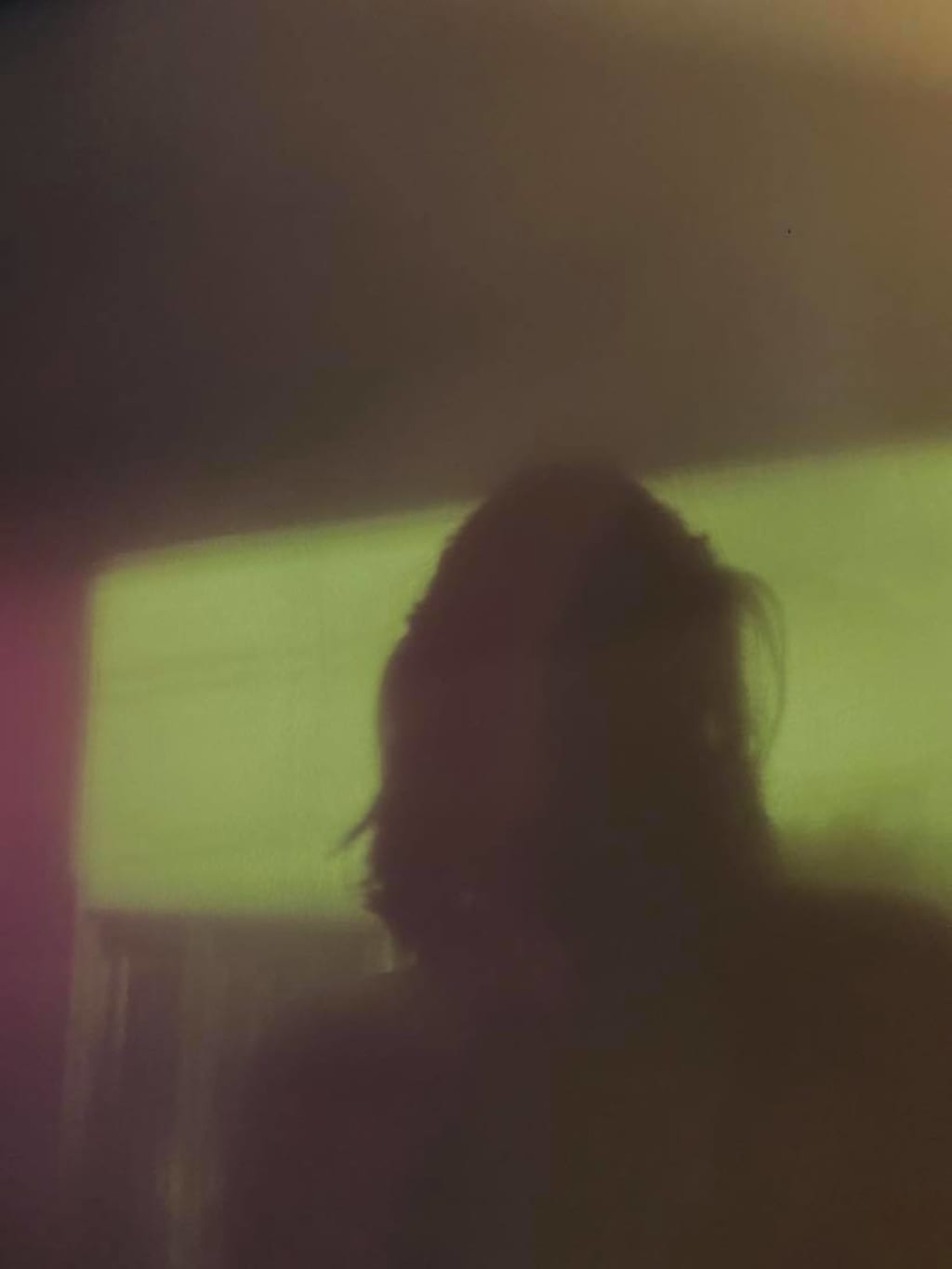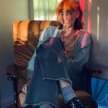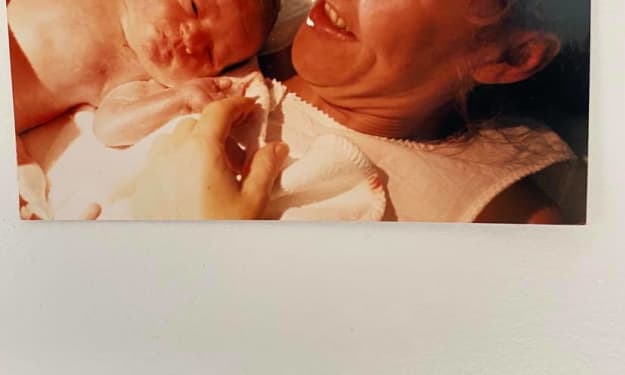
I have a sick dog smell and my head feels barely attached to my neck stump, so when the tram lurches it swings from side to side. It feels like there’s cellophane over my eyes. Everything is filmy. Milky. But I can still see things. Just yesterday I saw Them beating a small woman with yellow hair, right out the front of Myer on Bourke Street. I saw them in their black vans taking children.
When the sun comes in through the tram window I don’t squint, just let the heat burn holes in my retina. I don’t feel anything much with my body anymore – I’ve been resisting the numbness but still, my skin feels like the tough brown leather of a farmer’s shoes. I try and turn my consciousness to liquid – let it seep through the cracks I’ve been making in my mind.
The cracks are my progress. It’s how I can see what They’re doing to us.
My mother told me not to look at the sun, but now I like staring ‘til it hurts, and I can see it when I blink. I look around, blinking the back dot onto the empty faces of people on the tram, erasing them. I do things like this often. I check if my body is still my own. I am relieved that the sun still hurts my eyes. When I prick my fingers with the safety pin I carry in my pocket, the sting is distant – more sensation than pain. But still – I can feel it through the cracks. I wear shoes too small for my feet so that I always have blisters. I focus on the feeling of my skin rubbing against the insides of my boots when I walk through the city.
I have no way to prove that I am still myself, but I have been taking the Antidote. My mother left it for me before she was taken. The tiny vial is safe in her locket – two silver wings curled into the shape of a heart. I wear it around my neck. It’s been helping. The cracks in my mind are getting bigger. I’ve been seeing more and more. But there isn’t much left. The vial is almost empty. I have to do it today.
I cough. It’s a wet cough hardened. It sounds like stones in my lungs. I know there is nothing wrong with my body. The cough is a symptom they implanted in my brain. I pulled a stone out of my mouth once – smooth and shiny and black. I felt it in the palm of my hand – the weight of it – the coolness against my skin. It’s how they trick you. They make you think you are going insane, and then you want to take the Medicine.
When it started, I thought the Sickness was real. They said it was contagious and spreading too quickly to contain. They said the Symptoms included hallucinations and paranoia. Everyone had Symptoms. Everyone wanted the Medicine.
My mother knew all along that the Sickness wasn’t real, but when I started coughing up stones and sprouting wings where my shoulder-blades pressed into my skin, I decided to ignore her. I needed the Medicine. I thought I was losing my mind. I guess was. But it wasn’t because of the Sickness. It was because of the stuff they were putting in the water.
My mother never had Symptoms. She stopped drinking from taps when I was five. She collected water from the creek behind our house and stored it in jars in the basement. When I was little, I drank from the jars. I think it helped the cracks to start forming. But at thirteen, I started drinking tap water in rebellion. I was angry with the strangeness of mother. Now I am angry with myself. I should have believed her. She told me the water was just the beginning. It was a way to make people believe they had the Sickness. Then they would take the Medicine. I asked her why they didn’t just put the Medicine in the tap water. She said they wanted more control. They wanted to know who was taking it, and who wasn’t. She said I had to look for the cracks. She said I had to turn my consciousness to water. She gave me the locket. I tossed it on the floor. I wanted my life to go back to normal. I wanted to keep going to uni and selling computers on the weekends. I went to the Clinic for my Medicine. Then they took her.
I watched it happen through my bedroom door. They didn’t even bother to close it when they took her. I could see all the way down the hall to the front door. I didn’t see them at first – only heard the door open – and then there were these spots of black shimmering in the hallway. I thought it was a Symptom. I closed my eyes and tried to go back to sleep, but I could hear my mother whispering. She sounded afraid. I opened my eyes again and tried to focus on the black spots. Consciousness like water, said my mother’s voice. I didn’t know what it meant, but I tried anyway. I let my mind go gooey and soft. I pushed myself up against that thick grey screen that had been growing inside me for weeks. Slowly, the black dots spread like ink, joining together, until they became the shapes of people dressed in black. There was two of them. I couldn’t see their faces. It was like someone had scrubbed their features off with cotton wool. They disappeared into my mother’s room. I heard her scream. Then they returned to the hallway, dragging her limp body by the arms.
It was the last time I saw her.
I know I’m not meant to access those memories. Even now it makes my head feel dull and heavy, and the memories turn fuzzy and bland. I clutch instinctively at the locket, cool against the skin on my chest. The tram bell dings. It only stops at the Clinic now. I get off with everybody else. I focus on the blisters on my heels.
There is a door in the Clinic that they think I can’t see. Last week I sat in the waiting room and I let my mind soften. I’m getting stronger. I slipped through the grey screen inside me so easily – then I saw it. A black door with a silver handle. Today I am going to open that door. I’m prepared. My mother knew it would happen eventually. She left a black suit in the back of her wardrobe to wear as a disguise. Pinned to the suit was a note she had written with a children’s texta on a yellow sticky note;
They won’t question you once make it to the other side.
I follow the others up the steps to the Clinic. The building is white and textureless, like it’s made from printing paper. If I look at it for too long the whole thing kind of shimmers. The sky behind is a startling blue. There aren’t any clouds. The woman in front of me says it’s a beautiful day. Somebody murmurs in agreement. We trickle into the Clinic. The waiting room is the same brilliant white – the floor and ceiling all made of that textureless substance. We sit on the rows of chairs facing the white door with the neon blue sign above: Medicine will be Administered in Alphabetical Order. Please Wait for your Name to be Called over the Intercom. I sit in the front row for a few minutes. I pretend to play a game on my phone. My surname begins with a W. I have time. Bill Abercrombie, says the intercom. I watch Bill open the white door and close it again behind him. Then I get up. I make my way to the other white door with the sign that says Restrooms. Again, it is all white and vaguely shiny. There aren’t any mirrors.
I go into a cubicle. I change into the suit that is tucked in my backpack. It feels heavy. The fabric itches. I open the locket around my neck. I take out the vial and unscrew the tiny blue lid. I drink what’s left. That familiar bitterness stings my tongue. It feels like dissolving my tastebuds. I gag. I feel my mind turn sharp and brittle. I feel the fissures widen. I place the empty vial back inside the locket. Then I don the surgical mask my mother left in the pocket of the suit jacket. I go back into the waiting room, leaving my backpack and my old clothes in a heap on the cubicle floor.
Nobody looks at me. I sit back down in the front row and stare at the wall with a mind like water. I feel for the cracks and I slip through one. The door appears instantly. A black door with a silver handle. I look around, but nobody has taken any notice. I stand up. Still – nobody looks. I walk over to the door. I wrap my fingers around the silver handle. I half expect it to dissolve with my touch – but it is there, cool and smooth. I draw a breath. Then I push down the handle and open the door.
At first it is so bright I can’t see anything at all. I blink a few times and a corridor materialises in front of me. It is so quiet I can hear the fibres of my suit rubbing together. I notice that the walls are mirrors. I turn and look at myself. I see a figure in a black suit. I almost scream when I look at my face. I take off the mask and look again, but it is the same – featureless and blurred. No eyes, no nose, no mouth. I reach my hands up to my face. I trace my eyes, the bump on the bridge of my nose, my cupids bow – with the tip of my finger. I can feel it – yet when I look in the mirror for the third time, I am faceless.
I hear something coming from the end of the corridor, which seems to go on forever. A figure wearing black is coming towards me. It seems like they are gliding a few feet off the floor. They are faceless, too. I realise we must look like mirror images of one another. Then, the figure speaks,
“I knew you would figure it out.”
I gasp.
“Mum?” I stutter. I look again into her face, but there is nothing familiar there – just a faintly swirling blur.
“I thought They took you.” My voice wavers. I want to hug her, but she doesn’t seem like my mother anymore.
“I was going to get you out,” I say.
“In doing so, you figured out a way in.” she says. “I was one of the first to realise. I knew when they were coming for me. I wanted to go. I was ready. It’s a test, the whole thing. The Sickness. The Medicine. They want to know who can figure out what’s real –who can train their mind to see through the cracks.”
I make some kind of grunting noise. I think of Them beating that woman on Bourke street. I think of them in their vans removing children from playgrounds.
”I don’t want to be one of Them,” I say weakly. “I didn’t come here to be one of them.”
“But you are one of Them,” She says blankly, “Because you figured it out.”
“But why did you scream that night, if you knew they were coming? Why did you seem afraid? I thought you could be dead. I thought They killed you.”
“I didn’t want to make it too easy for you,” she says without inflection.
“We wanted to keep up the illusion.”
About the Creator
Erica Williams
A writery human from Melbourne with a penchant for self indulgent memoir, sad girl poetry, and sometimes the odd bit of off-kilter fiction






Comments
There are no comments for this story
Be the first to respond and start the conversation.